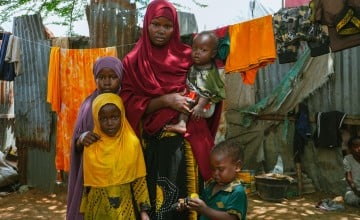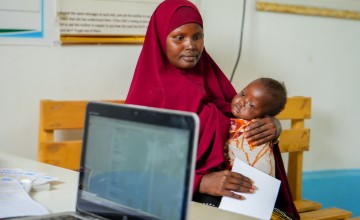
Read our 2023 annual report

Knowledge Hub
"I can't even describe it. It was just one bad day after another. My children cried from hunger. There were nights we went to sleep without eating anything at all."
Ayan’s voice shakes as she remembers her first months in a displacement camp in Mogadishu, Somalia. Around her, the Siinkadheer Health Facility is alive with movement and noise. Nurses move from room to room, babies cry, and mothers confer in hushed tones.
Ayan is 26 years old and a mother of five. Her eldest is nine, and her youngest is just a year old. Before, Ayan lived in a village in the Bay Region, raising goats and farming the land. "I used to grow peas and beans," she says. "We had food, we had animals, and we survived on what we made."
But then: Drought.

Leaving home behind
"At first, it was small," she says. "The rains didn't come on time. But then it got worse. The land dried up, and the animals started dying."
One by one, her goats perished. Her farmland dried into cracked dirt. She made the decision to leave. "I sold my last two goats. I bought a place on a truck to Mogadishu."
The truck was originally used for transporting livestock, but in the Somalia of today, it is people that are moving in mass. "Around 20 of us were packed in there," she says. "It was so tight; we could barely move." When the truck stopped in villages along the way, kind people came from their houses offering food and water.
Nearly four million people are internally displaced in Somalia, forced from their homes by a combination of conflict, drought, and flooding. In search of food and water, they travel to displacement camps; sprawling settlements of makeshift shelters, dotting the outskirts of Mogadishu, Baidoa, and other urban centres.

After three days, Ayan and her children made it to Mogadishu, and the displacement camp. But their struggle to survive continued.
“We had nothing," she says. "No food, no water, no shelter. We slept on the ground."
When forced to leave land, livestock, and livelihoods, parents struggle to feed their children. In Somalia, about 1.7 million children under the age of five are expected to face acute malnutrition between August 2024 and July 2025.
Ayan had left her home in hope of saving her children. Now, their lives were hanging in the balance.
Concern and the European Union
One morning, Ayan saw a group of strangers walking around the camp, talking to people.
"I heard them talking about helping malnourished children and providing free medical care," she says. "They were also giving cash to people in need."

Concern and European Union Humanitarian Aid collaborate through two programmes in Somalia. The Caafimaad Plus Consortium provides nutrition, clean water and sanitation, and primary health care. The Somali Cash Consortium (SCC) provides cash, with no strings attached. The two programmes work hand-in-hand: When a child is hospitalised with malnutrition, the family are provided with cash, to help with life outside the health facility gates.
The group that Ayan encountered were an outreach team from Concern Worldwide, going from shelter to shelter. The outreach team assessed Ayan’s children, and identified her youngest child, Mohamed, as malnourished. He needed urgent medical attention.

Mohamed was referred to the Siinkadheer Health Facility, which is operated by Concern, with funding from the EU. After receiving supplementary feeding, Mohamed recovered, to the joy of his mother. However, Mohamed was not safe yet. As conditions of extreme poverty persist outside the facility gates, health workers often see children returning, again malnourished.
A few weeks later, with one text message, Ayan received a lifeline.
Breathing space
"I was sweeping the floor when I got a message on my phone," Ayan says, smiling. "I checked it, and it said I had received 180 dollars."
Over 50 years of on-the-ground humanitarian work, and extensive academic research, has informed Concern’s understanding that directly giving cash is an effective way to support people experiencing a crisis or disaster. If there are functioning markets within reach, cash provides a family the opportunity and agency to meet their self-assessed needs.
"With that money, I could pay for my children's madrasa [schooling]. I have three children in madrasa, and it costs 10 USD per month for each child," Ayan says. "I also bought food for them. I hadn't been able to afford fresh vegetables in so long. They were so happy to eat peas and maize again. It reminded me of home."

Life is still hard for Ayan. She still lives in extreme poverty. But the cash has given her breathing room. She has space to plan, to dream.
"I want my children to finish their studies and live in a good home. This little bush we're living in now is not what I want for them," she says. “In the future, I want to stand on my own feet and open a small shop. I don't want to depend on anyone anymore. I want to be strong for my children.
"I believe we can make it. My children deserve better, and I will fight for them."
Names have either been changed or withheld




